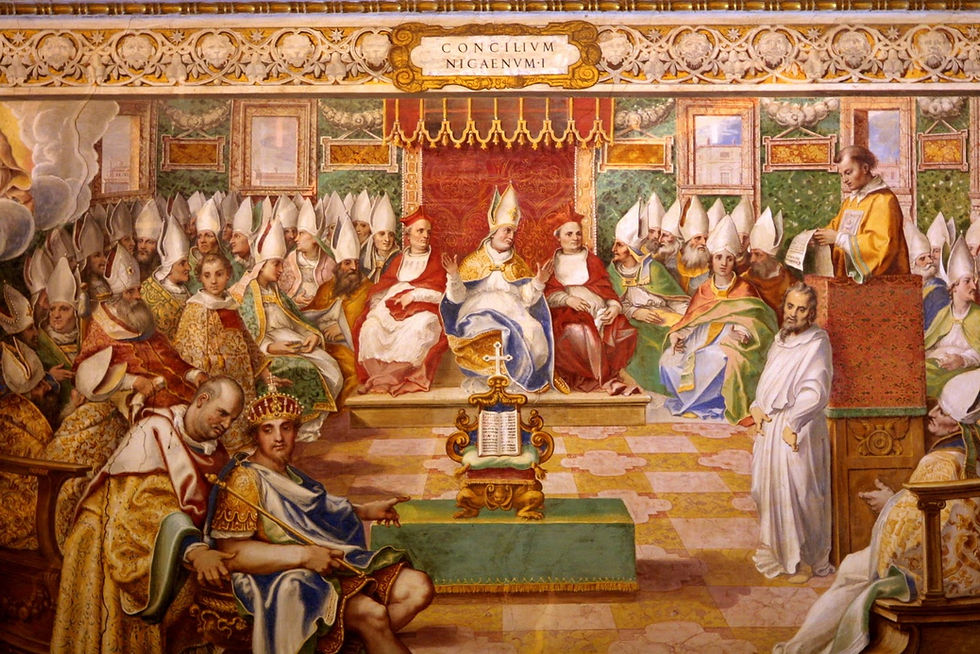The 4th Century Controversy
- Howard Ens
- Jul 19, 2019
- 3 min read

The mystery of the second member of the Godhead becoming man has been a topic of much controversy throughout the church age, particularly the early church years. Even in the early years of the church these questions were asked and were not totally answered. However as the church advanced, the teaching that surrounded this mystery became more and more clear as insight into the Scriptures came along by church leaders.
Consistently Jesus Christ is presented in the Gospels as one who is both truly man and truly God. According to the Scriptures, we cannot think of God without knowledge of Christ, for Christ. Jesus says, “Whoever has seen Me has seen the Father” (John 14:9).
Immediately after the New Testament, the early church leaders emphasized the deity and humanity of Jesus Christ. We have a record of a sermon beginning like this, “Brethren, we ought to think of Jesus Christ, as of God, as the judge of the quick and the dead.” Later in the early church era, a church father spoke of Christ in this way, “He became what we are, in order that He might make us to become, even what He is Himself” (partakers of the divine nature 2 Peter 1:4).
Throughout this time, many false teachings were surfacing about Jesus’ deity and humanity, teachings that ran contrary to Scripture. At the council of Nicaea in 325, some false teachings that surfaced were condemned. At this council, they insisted that the Son was not simply the “firstborn of all creation” but was indeed of one essence with the Father.
After Nicaea, the question was raised: If Jesus Christ be truly God, how can He be at the same time truly man? In other words, how, then, can God and man be united in one person?
As time went on, further controversies would develop before the mind of the church could be made up as to how the human nature could indeed retain its complete humanity and yet be without independent subsistence.
At the Reformation, Martin Luther’s Christology was based on Christ as true God and true man in inseparable unity. He spoke of the ‘’wondrous exchange’’ by which, through the union of Christ with human nature, His righteousness becomes ours, and our sins become His.
From the Divine to the Human Nature
Although Jesus’ nature did not change in character, because it was united with the divine nature in the one person of Christ, Jesus’ human nature gained (1) a worthiness to be worshipped and (2) an inability to sin, both of which did not belong to humans before.
From the Human Nature to the Divine Nature
Jesus’ human nature gave Him (1) an ability to experience suffering and death; (2) an ability to understand by experience what we are experiencing; and (3) an ability to be our substitute sacrifice, which Jesus as God alone could not have accomplished.
Jesus’ full humanity and Deity are both necessary, for numerous reasons.
In His humanity Jesus became our Obedient Representative Head. Jesus is our representative and obeyed for us where Adam had failed and disobeyed (Romans 5:18-19).
He also came to be a Substitute Sacrifice; if Jesus had not been a man, He could not have died in our place and paid the penalty for our sin. Humans die, so in order for Jesus to die, He had to become human.
“Therefore, in all things He had to be made like His brethren, that He might be a merciful and faithful High Priest in things pertaining to God, to make propitiation for the sins of the people” (Hebrews 2:17).
In His Deity Jesus also became a Substitute Sacrifice. Only someone who is infinite God could bear the full penalty for all the sins of all those who would believe in Him. Any finite creature would have been incapable of bearing that penalty, as Jonah 2:9 says, “Salvation is of the LORD.”
As the Scriptures being our final authority, we must not forget the words penned by the apostle John when touching on this subject. He writes, “For many deceivers have gone into the world who do not confess Jesus Christ as coming in the flesh. This is a deceiver and an antichrist … Whoever transgresses and does not abide in the doctrine of Christ does not have God. He who abides in the doctrine of Christ has both the Father and the Son. If anyone comes to you and does not bring this doctrine, do not receive him into your house nor greet him; for he who greets him shares in his evil deeds” (2 John 7; 9-11).



